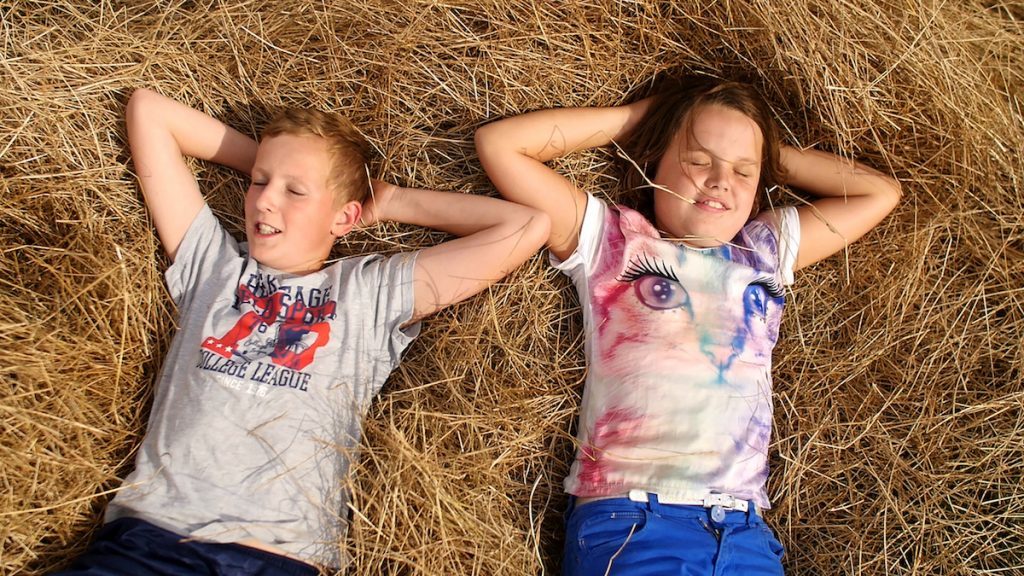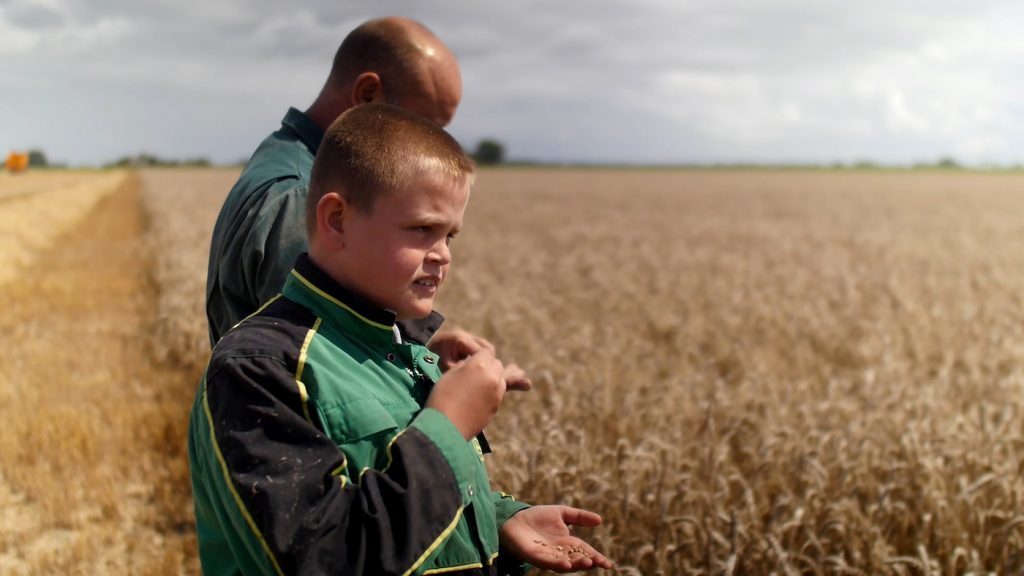
Case Study: CERES
CERES is a poetic and tangible documentary film that follows four children as they experience the natural cycle of life on a farm.
Geplaatst op 8 maart 2019CERES is Janet van den Brand's (29) first feature documentary film. In film school she studied fiction film and graduated with a short fiction film, so in the beginning of the process of CERES a documentary form had never really occurred to her. However, the idea of CERES had been settling in her mind for quite some time already, and at that point it could still take any form - for she was more so focusing on a theme in the beginning.
"I just graduated and had a simple camera and some basic sound equipment. But this was all I needed. I had so much freedom to let the project ripe and take form, to let it grow organically."
Why this movie?
“CERES is a film about four young farmer children, growing up on the farm and learning their profession from a very young age from their fathers and grandfathers.
I grew up on the countryside myself and my grandfather had a small diary farm. I remember the harvest season as the most beautiful time of the year. In my memory it was always very warm, the sky was full of dust and our skins were still salty from our swim in the sea. The air was heavy with the sweet smell of the ripe grains and the colors were deep and intense. As far as I could see the grain field stretched to the horizon. The days were long and warm. Looking at it now, it is just a very small patch of land, but as a child I experienced this in a whole different way. This is how the idea of CERES began to grow. I wanted to film the childs perspective of a life on the farm and the harvest cycle. I started searching for stories and inspiration and choose to go back to the roots of my grandmother: Zeeland. I found this landscape so inspiring, so stretched and wide and empty.”
Childlike fascination
“Once there, in Zeeland, I met some farmers – friends of my parents. We talked about the project and they introduced me to Koen (one of the main characters of CERES). When I met Koen I knew from the very first moment that we would make this film together and that CERES was going to be a documentary. For I found his story so touching and interesting. He showed me all his animals and told me the story of how he had some pigs, which he loved dearly, but he had to let them go because it was part of the farm life. With Koen I found my first storyline, that fitted perfectly in the idea of the cycle. All life on the farm is in a way connected to this cycle. Animals are being born and slaughtered, crops are sown and harvested, the seasons go by and the farmer directs his life and rhythm according to these seasons. From that moment I started searching for other kids, for I liked a variety of experiences and I soon noticed that the children have very different point of views on the same subjects. Via Koen I found Daan and Sven, who are into agriculture and fruit, and via a school I found Jeanine, who lives on a sheep farm.”

The crew
“Together with my boyfriend and D.O.P. Timothy Wennekes I drove to Zeeland every other weekend to film some images and also just to spend a lot of time on the farm, to learn and to play. Like this I followed Sven, Daan, Jeanine and Koen for a year and a half and meanwhile the project started to grow. I found fundings via the VAF (Flamish Audiovisual Filmfunds) and a producer and we could finish the film in a professional way, without losing my creativity and freedom that was so important in making this film. Rather than high end film equipment and a professional crew we choose for time, to spend a lot of time on the farm and build the film slowly, image per image. This was a wonderful process.”
The process
“Filming, writing and editing all happened simultaneously during the process of making CERES. I started filming, researching with my camera and started writing as soon as I found the major storylines. I started editing in a very early phase, also to make some short clips to show to others. This influenced the script of course, and that influenced the shooting. There was no strict way of doing things, I followed my intuition and let things grow organically. In order to be able to do this, I needed to trust myself and the project a 100%. And because of my own strong connection to the subject and my own childhood memories, I could do this. I never thought to make this film for a big audience, I thought of it at something I would like to watch myself and show to local farmer families in the neighborhood of our shooting locations. It was to my great surprise that it turned out to be a success in festivals.”
Producer or no producer?
“I realize now that I could never have worked this way have I had a more professional approach on the film from the beginning. As my first film, it was difficult to find a producer who trusted this way of working. So it was only later, when I already had something to actually show and when I found my first fundings, that I could find a producer. This is for the best, because I worked some time on the project already without a producer and with total freedom. And now, already working on the second and third project together, my producer totally understands we need that freedom in the beginning of the process.”
The workflow
“As we had a very small crew (most of the times just me or me and my boyfriend, only in some occasions we worked with an extra sound engineer) the production was very easy. We bought a crappy small car (which we still have, by the way) and drove to Zeeland whenever we could or whenever something was about to happen. This was not something we could plan very well, because often it depended on the weather whether something was about to happen or not. I remember going to Zeeland for three times before we could finally film the scene where the calve is born. This things you can’t plan, but that was a good thing in a way because it forced us to invent a lot and work spontaneously. For example, when a storm is coming up or a piglet is to be born, there is no time to prepare. This was a little stressful at times but we managed just fine and created a workflow in which we can work very fast.”

Post production...
“After the shooting period I started working with an editor on the film. This was a whole different process but also a nice one because now we got a lot of help and ideas from our producers. While editing I still did some shooting days, for I would find out some images or scenes or interviews were missing. The edit was difficult because I had had so many shooting days, so much material. We ended up not using a lot of it, which was of course a pity but necessary.
The sound post production was a wonderful process. It was really hard work for we had little time and a lot to do, but it was great. Here we had a certain amount of days, we lost our freedom to just go and do whatever we wanted because we could only work in the studios for a fixed amount of time. So yes, there was pressure, but I think we created something beautiful. In the sound edit and mix we started looking for the big lines. Because the edit is more of a collage, sometimes with ten different images from different days and places in one scene or sequence, the sound needed to be more clear, more directing. We found sounds and musical lines for each of the characters and even gave Ceres (the Roman goddess of harvest) a voice in the music. Her song is a hymn about spring and the vocals are the starting point for all other musical scores in CERES. She is the theme of nature in the film and tells the story of the seasons and the cycle.”
... Now more professional than ever!
“In the end we made color corrections, compositing, end credits etc in a studio. This was all very new for me for we never did this in my student films. But it was nice to finish the film in a professional environment. We started sending the film in for some festivals and fortunately we could have our premiere at the Berlinale Generation in 2018. This was so wonderful and unexpected, thinking back to the beginning of the process where we expected nothing from this film but to make it for ourselves and a very small audience. After the Berlinale, other festivals followed and I could travel to different countries to represent CERES. I liked this a lot but for me it was very important that I had some new projects coming along as well, otherwise it might have felt a little empty. For you worked such a long time and so hard on this project and then suddenly it’s out there and you are very vulnerable. It’s not your project anymore, it’s also the audiences, the juries’, the reviewers film now. This is great, but also insecure and one might miss the process of being out there again and just making the thing in a very safe environment. So I started my new project and made sure we had a first proposal before we premiered at the Berlinale. And as my new projects are coming along, I still visit film festivals with CERES. It makes a great combination!”